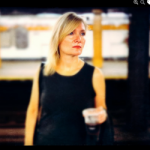
I’m Incredibly Nearsighted but My Hindsight is 20/20
I did it again last week. We reach the moment in my son’s annual physical where the pediatrician checks his vision, and I instinctively held my breath.
He’s turning nine, and his brother is now 12, and neither one needs glasses yet. But odds are it’s only a matter of time. My husband was just nine when a pair of glasses first was perched on his nose by a cheerful optometrist. We’re both ridiculously nearsighted. I was turning 10 when I got my glasses, just weeks into the fall semester at a new school where I had no friends yet.
I can still picture the school nurse checking my eyes and ears, then handing me a folded slip of paper.
“Take this note to your mother,” she said. “Tell her you needed glasses.”
“What??” I wanted to scream. “I’m the new kid! I don’t know anybody yet! Now I’m going to be the new kid with glasses!”
But I said nothing. She’d already moved on to the next kid in line, and my fate was sealed.
I gave my mom the paper after school, went with her to the mall the following day and quietly began my life as The New Kid with Glasses. Definitely not the worst thing that has ever happened to a fifth-grader, I know. Not even close. And yet, it felt pretty apocalyptic at the time.
I was already the least athletic kid I knew, but my glasses soon made gym class a new form of torture. I still remember standing in the gym in my Keds, waiting to be picked for a team, feeling the slow burn of embarrassment at being picked dead last mingling with the fear that a dodge ball would soon be smashing my new glasses.
It almost seems quaint now that two boys in my class took to calling me “four-eyes,” as if that phrase belonged to the 1950s instead of 1978. But they did, and it made me feel like an idiot every time.
“I’m the new kid! I don’t know anybody yet! Now I’m going to be the new kid with glasses!”
It’s strange to be given a social marker like that when you haven’t even begun figuring out who you are. Those glasses formed a wall between me and everyone else, a big plastic billboard that announced my awkwardness to anyone who hadn’t noticed. And it stayed that way for years.
Today, those dormant memories churn up each time one of my kids covers one eye and begins reciting the tiny letters down low on the eye chart.
“D,” I think to myself, willing him on silently as I peer through my super-strength contact lenses.
“E, F, P, O…”
Who, exactly, do I think I’m helping?
The stories we tell ourselves about the past often include a catalyst — some choice we made or situation thrust upon us that affected everything after. We map out our history, isolating the plot twists like we’re analyzing a movie, and over time we slowly carve the important ones into sharper and sharper relief.
That first pair of glasses — “speckled seafoam” was the color of the frames, and I can still see it printed on the display at the doctor’s office — was the catalyst that I’ve long told myself made me even more shy and silent than I’d already been becoming.
Sometimes carving your personal story into sharp relief can be useful. Isolating the big moments can push you forward and give a discernable shape to the randomness life throws at us. But it’s also way too easy. Life and people are much more complex than simple cinematic plot twists would suggest. Looking back on those big turning points can also slow you down, convincing you that one roadblock or hot mess (that maybe wasn’t really so bad after all) ruined things for years to come. And that leads to believing that one hot mess on the horizon could ruin what’s so good today.
There’s no proof that if either of my boys got glasses they would shrink inside themselves like I did. And honestly, I might have been just as shy and voiceless back then, glasses or no glasses. There are childhood crises that can change everything. Being the kid other people bust on for wearing nerdy green glasses is not, nor does it have to be, one of them.
I can’t change the fact that the 10-year-old kid inside me wasted years on self-doubt and let that be fueled by peering out from behind awkwardly thick lenses. But my job now is to keep from conveying to my kids that, if they meet the same fate, it’s an automatic disaster. Parents spend many hours teaching and explaining, and that’s generally a good thing. But sometimes the very best thing we can do is know when to shut up.
That much, I can finally see.
(Photo credit: David Travis/Flickr.com)
Leave a Reply


Tell Us in the Comments
What do you think?